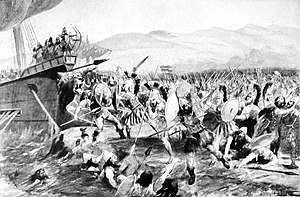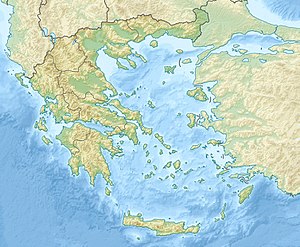 Global Information
Global InformationBattle of Marathon information
| Battle of Marathon | |||||||
|---|---|---|---|---|---|---|---|
| Part of the first Persian invasion of Greece | |||||||
 1900 depiction of the Battle of Marathon | |||||||
| |||||||
| Belligerents | |||||||
| Achaemenid Empire | ||||||
| Commanders and leaders | |||||||
|
| ||||||
| Strength | |||||||
| 10,000–11,000 men |
| ||||||
| Casualties and losses | |||||||
Herodotus: 203 KIA
|
Herodotus: 6,400 KIA
Other estimates: 4,000-5,000 killed[5] | ||||||
 class=notpageimage| Location of the Battle of Marathon | |||||||
The Battle of Marathon took place in 490 BC during the first Persian invasion of Greece. It was fought between the citizens of Athens, aided by Plataea, and a Persian force commanded by Datis and Artaphernes. The battle was the culmination of the first attempt by Persia, under King Darius I, to subjugate Greece. The Greek army inflicted a crushing defeat on the more numerous Persians, marking a turning point in the Greco-Persian Wars.
The first Persian invasion was a response to Athenian involvement in the Ionian Revolt, when Athens and Eretria sent a force to support the cities of Ionia in their attempt to overthrow Persian rule. The Athenians and Eretrians had succeeded in capturing and burning Sardis, but they were then forced to retreat with heavy losses. In response to this raid, Darius swore to burn down Athens and Eretria. According to Herodotus, Darius had his bow brought to him and then shot an arrow "upwards towards heaven", saying as he did so: "Zeus, that it may be granted me to take vengeance upon the Athenians!" Herodotus further writes that Darius charged one of his servants to say "Master, remember the Athenians" three times before dinner each day.[6]
At the time of the battle, Sparta and Athens were the two largest city-states in Greece. Once the Ionian revolt was finally crushed by the Persian victory at the Battle of Lade in 494 BC, Darius began plans to subjugate Greece. In 490 BC, he sent a naval task force under Datis and Artaphernes across the Aegean, to subjugate the Cyclades, and then to make punitive attacks on Athens and Eretria. Reaching Euboea in mid-summer after a successful campaign in the Aegean, the Persians proceeded to besiege and capture Eretria. The Persian force then sailed for Attica, landing in the bay near the town of Marathon. The Athenians, joined by a small force from Plataea, marched to Marathon, and succeeded in blocking the two exits from the plain of Marathon. The Athenians also sent a message to the Spartans asking for support. When the messenger arrived in Sparta, the Spartans were involved in a religious festival and gave this as a reason for not coming to help the Athenians.
The Athenians and their allies chose a location for the battle, with marshes and mountainous terrain, that prevented the Persian cavalry from joining the Persian infantry. Miltiades, the Athenian general, ordered a general attack against the Persian forces, composed primarily of missile troops. He reinforced his flanks, luring the Persians' best fighters into his center. The inward wheeling flanks enveloped the Persians, routing them. The Persian army broke in panic towards their ships, and large numbers were slaughtered. The defeat at Marathon marked the end of the first Persian invasion of Greece, and the Persian force retreated to Asia. Darius then began raising a huge new army with which he meant to completely subjugate Greece; however, in 486 BC, his Egyptian subjects revolted, indefinitely postponing any Greek expedition. After Darius died, his son Xerxes I restarted the preparations for a second invasion of Greece, which finally began in 480 BC.
The Battle of Marathon was a watershed in the Greco-Persian wars, showing the Greeks that the Persians could be beaten; the eventual Greek triumph in these wars can be seen to have begun at Marathon. The battle also showed the Greeks that they were able to win battles without the Spartans, as Sparta was seen as the major military force in Greece. This victory was overwhelmingly won by the Athenians, and Marathon raised Greek esteem of them. The following two hundred years saw the rise of the Classical Greek civilization, which has been enduringly influential in Western society, and so the Battle of Marathon is often seen as a pivotal moment in Mediterranean and European history, and is often celebrated today.
- ^ Plutarch, Cam. 19, 3; p. 139 http://penelope.uchicago.edu/Thayer/E/Roman/Texts/Plutarch/Lives/Camillus*.html
- ^ Briant, Pierre (2002). From Cyrus to Alexander: A History of the Persian Empire. Eisenbrauns. p. 158. ISBN 9781575061207.
- ^ a b Dougherty, Martin, J., 100 Battles: Decisive Battles that Shaped the World, Parragon, p. 12
- ^ "Pausanias, Description of Greece, Boeotia, chapter 4, section 2". www.perseus.tufts.edu.
- ^ Krentz, Peter, The Battle of Marathon (Yale Library of Military History), Yale Univ Press, (2010) p. 98
- ^ Herodotus Book 5: Terpsichore, 105 Archived 2013-12-11 at the Wayback Machine "...he inquired into who the Athenians were; and when he had been informed, he asked for his bow, and having received it and placed an arrow upon the string, he discharged it upwards towards heaven, and as he shot into the air he said: "Zeus, that it may be granted me to take vengeance upon the Athenians!" Having so said he charged one of his attendants, that when dinner was set before the king he should say always three times: "Master, remember the Athenians."